The 2016 European Championship will be remembered for a historic first: Portugal clinched their inaugural major international tournament victory. After decades of near misses and heartbreaking defeats, the Seleção das Quinas finally ascended to the top of European football, etching their name into the annals of the competition. This victory was not just a win; it was a culmination of years of progress and a testament to resilience, tactical pragmatism, and the unwavering spirit of a nation led by Cristiano Ronaldo.
The Pragmatic Approach of Fernando Santos
Portugal’s journey to Euro 2016 glory was orchestrated by Fernando Santos, a manager renowned for his pragmatic and results-oriented approach. Santos, who had previously coached the Greek national team to relative success, took the reins of Portugal after a shaky start to their qualifying campaign. His appointment marked a shift in style for Portugal, moving away from the more flamboyant and attacking football of previous eras towards a more defensively solid and strategically astute game plan.
Santos’s career path was diverse, having managed all of Portugal’s “Big Three” clubs – Porto, Sporting CP, and Benfica – and spending a significant portion of his coaching career in Greece. This experience shaped his philosophy, emphasizing tactical flexibility and the ability to grind out results, even when performances weren’t always dazzling. He prioritized solidity and organization, making Portugal a tough team to break down, a characteristic that proved crucial throughout their Euro 2016 campaign.
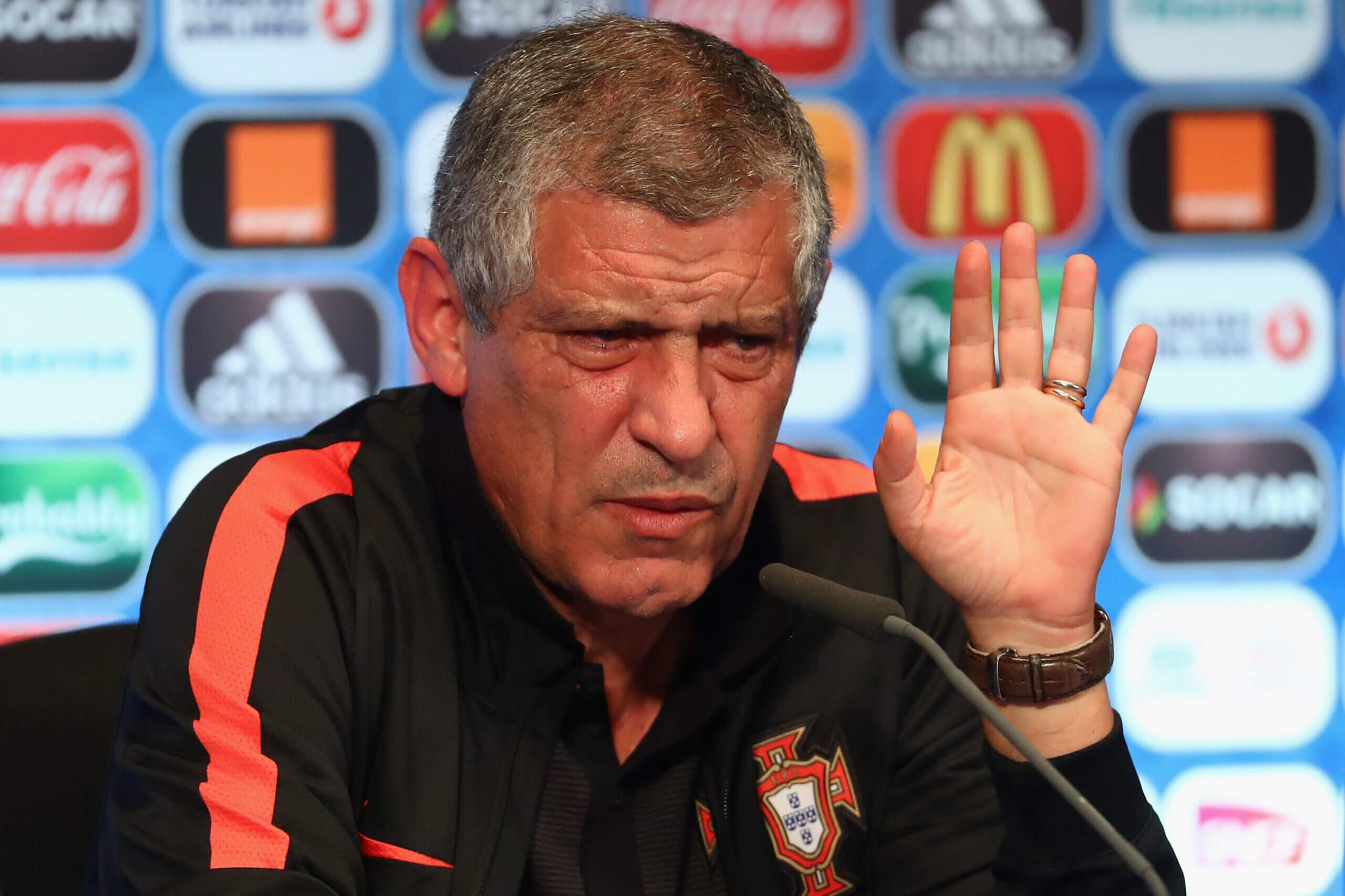 Fernando Santos pragmatic approach for Portugal (UEFA via Getty Images)
Fernando Santos pragmatic approach for Portugal (UEFA via Getty Images)
An Unconventional Path to the Knockout Stage
In a surprising turn of events, Portugal navigated the group stage without winning a single match. Their tournament began with a 1-1 draw against Iceland, a result that prompted a now-infamous outburst from Cristiano Ronaldo criticizing Iceland’s “small mentality” for celebrating a draw against Portugal. This was followed by a goalless stalemate with Austria, where Ronaldo also missed a penalty. The group stage concluded with a thrilling 3-3 draw against Hungary, a match where Portugal trailed three times, highlighting both their attacking capabilities and defensive vulnerabilities.
These three draws were enough to see Portugal through to the knockout stages as one of the best third-placed teams. The expanded 24-team format of Euro 2016 proved beneficial for Portugal, offering them a lifeline that wouldn’t have existed in previous iterations of the tournament. More significantly, their third-place finish placed them on what was perceived as the weaker side of the knockout bracket. While the likes of Spain, Italy, France, Germany, and England were clustered on one side, Portugal found themselves in the company of Croatia and Belgium, neither of whom had ever won a European Championship. This perceived favorable draw significantly boosted Portugal’s chances of progressing deep into the tournament.
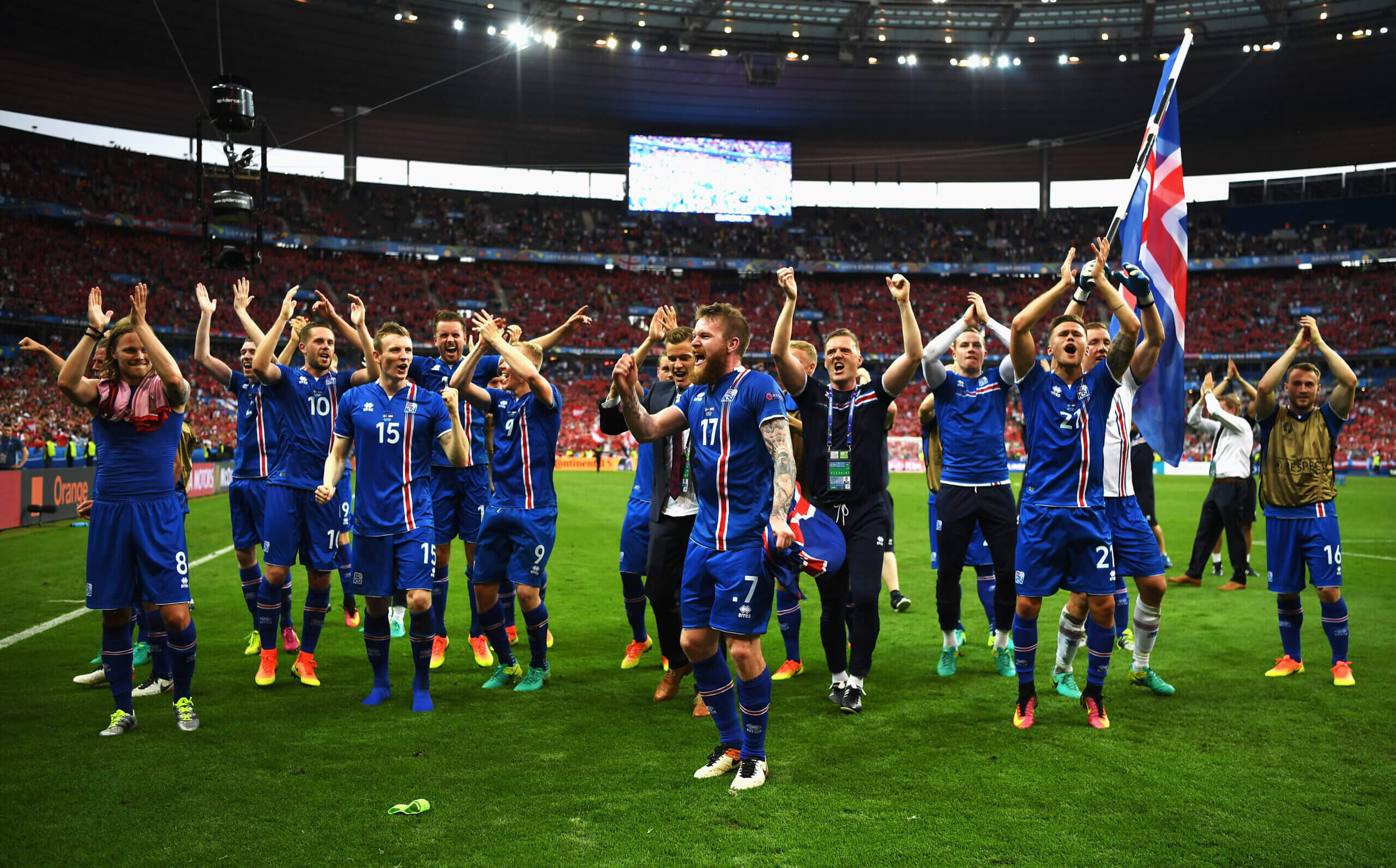 Iceland celebrating draw against Portugal Euro 2016 (Shaun Botterill/Getty Images)
Iceland celebrating draw against Portugal Euro 2016 (Shaun Botterill/Getty Images)
Tactical Flexibility and Ronaldo’s Role
Historically, Portugal was renowned for producing gifted wingers but often lacked a world-class center-forward. While players like Nuno Gomes, Joao Pinto, and Pauleta were effective in their own right, the spotlight in 2016 was firmly on Cristiano Ronaldo, arguably the most prolific goal scorer in European football.
Despite primarily playing on the left wing for Real Madrid, Ronaldo’s role for Portugal under Santos evolved into more of a central striker within a 4-4-2 or sometimes a 4-1-3-2 formation. This tactical adjustment was partly necessitated by the perceived lack of other top-tier striking options. Nani mirrored Ronaldo’s role on the right flank, albeit often in a slightly deeper and more disciplined manner. The midfield was typically comprised of four central players, sometimes resembling a diamond and at other times a flatter structure.
This tactical setup was a departure from Portugal’s usual 4-3-3. It essentially involved sacrificing a traditional striker to bolster the midfield and provide Ronaldo with the freedom to operate in his preferred inside-left channel. While Portugal’s goalscoring output wasn’t prolific – nine goals in effectively eight games, including extra time – their tactical discipline allowed them to control matches both in possession and defensively. Dynamic movement, particularly from Raphael Guerreiro on the left flank, and disciplined width on the right, ensured a balanced and effective approach.
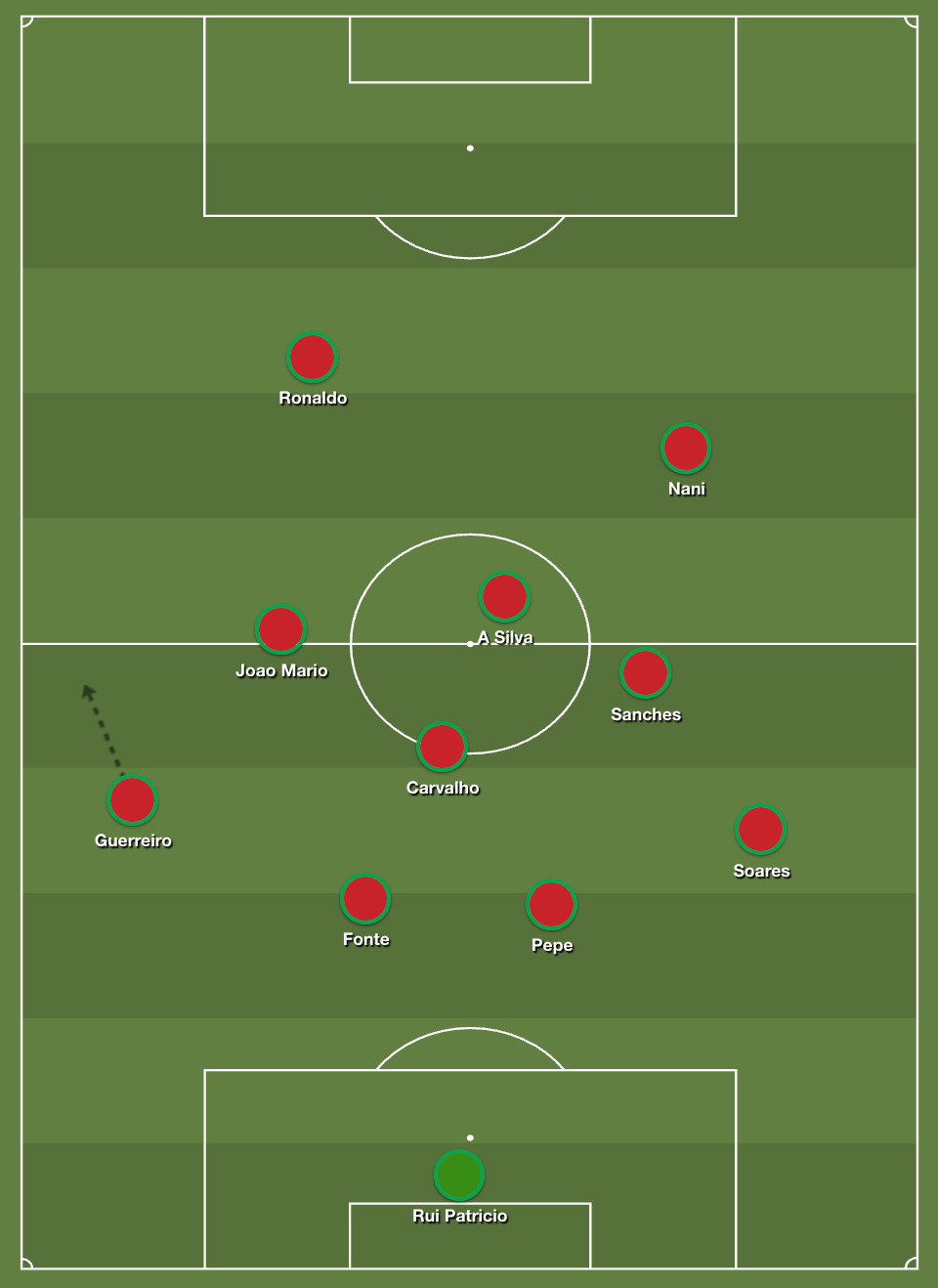 Portugal Euro 2016 Tactical Formation
Portugal Euro 2016 Tactical Formation
Key Players: Ronaldo and Pepe
Cristiano Ronaldo, who would later claim the Ballon d’Or that year, was undoubtedly the talisman of the Portuguese team. He scored three goals throughout the tournament, led the attacking line, and provided crucial leadership both on and off the pitch, most notably even after being injured in the final.
However, arguably the most consistent performer for Portugal throughout Euro 2016 was the veteran center-back Pepe. At 33 years old, Pepe showcased a maturity and composure that belied his earlier reputation as a fiery and sometimes reckless defender. Throughout the tournament, Pepe was dominant in aerial duels and provided a rock-solid presence in the heart of the Portuguese defense. Despite a thigh injury that forced him to miss the semi-final against Wales and limited his training before the final, Pepe delivered a man-of-the-match performance in the final against France, effectively neutralizing the French attack. Remarkably, Pepe, now in his 40s, continues to represent Portugal, highlighting his enduring quality and commitment.
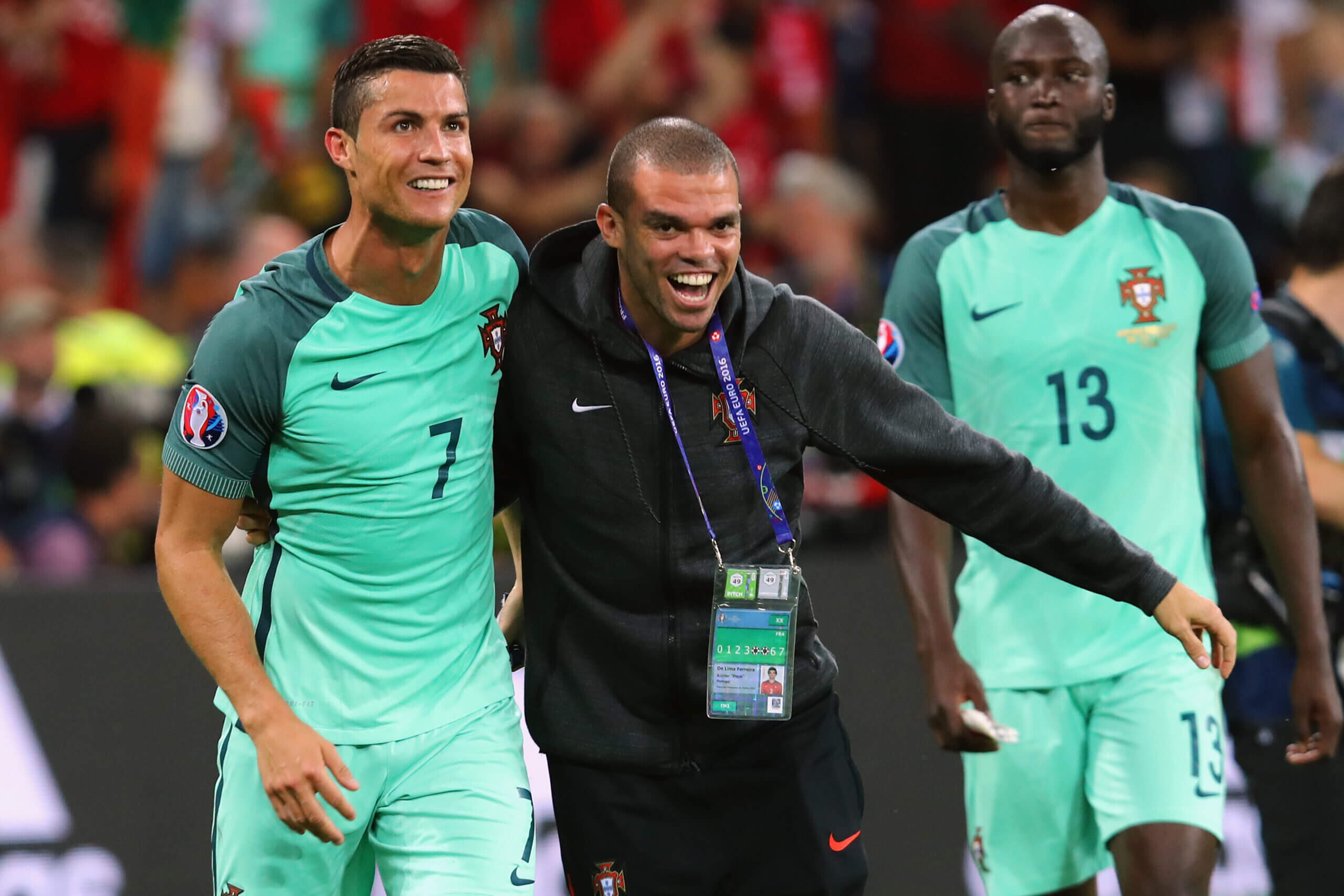 Cristiano Ronaldo and Pepe celebrating Euro 2016 victory (Alex Grimm – UEFA via Getty Images)
Cristiano Ronaldo and Pepe celebrating Euro 2016 victory (Alex Grimm – UEFA via Getty Images)
The Final in Paris: Overcoming Adversity
The Euro 2016 final was hosted in Paris, a poignant location for Portugal given their painful defeat on home soil in the Euro 2004 final. Adding an unusual element to the final was an infestation of moths at the Stade de France, attracted by the stadium lights left on the previous evening.
The match itself was significantly impacted by an early injury to Cristiano Ronaldo. Despite attempting to play on, Ronaldo was eventually substituted in the 25th minute, replaced by Ricardo Quaresma. This forced Portugal into a more defensive 4-5-1 formation, with Nani leading the line as a lone striker. Portugal struggled to create attacking opportunities after Ronaldo’s departure, failing to register a shot on target until late in the game.
France, despite playing at home, also struggled to impose themselves. Moussa Sissoko was arguably their most threatening player, highlighting a lack of cutting edge in their attack. Antoine Griezmann, the tournament’s top scorer, came close with a couple of headers, and both teams struck the woodwork – Andre-Pierre Gignac for France in normal time and Raphael Guerreiro for Portugal from a free-kick. The match remained goalless after 90 minutes, heading into extra time.
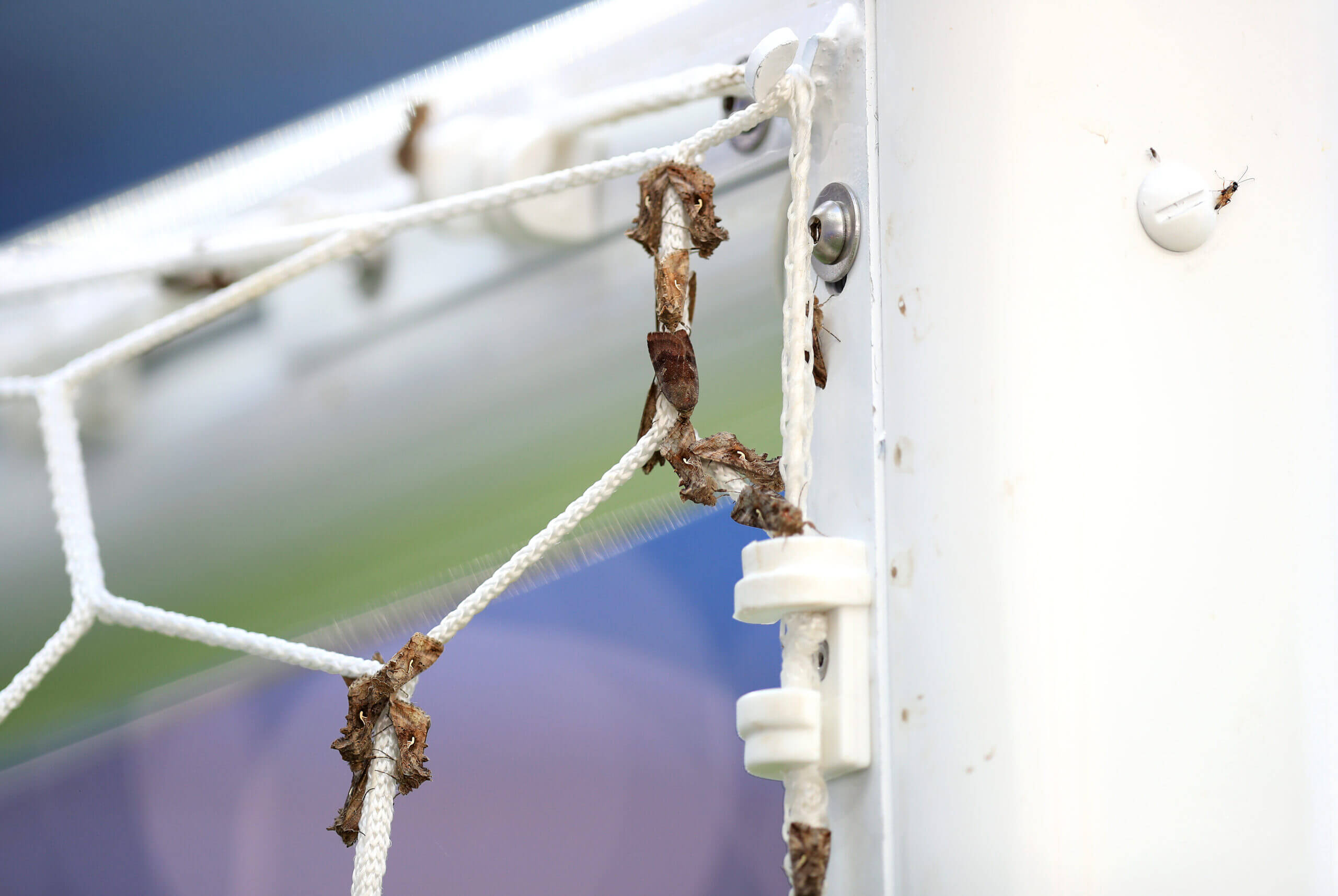 Moths at Stade de France before Euro 2016 final (Mike Egerton/Getty Images)
Moths at Stade de France before Euro 2016 final (Mike Egerton/Getty Images)
Éder’s Decisive Strike
The Euro 2016 final will forever be defined by the unlikely heroics of Éder. Born in Guinea-Bissau, Éder moved to Portugal as a child and had a journeyman career before joining Swansea City in 2015. His spell in the Premier League was unsuccessful, and he was subsequently loaned to Lille.
Prior to the final, Éder had only played 13 minutes in the entire tournament and hadn’t featured in the knockout stages. Even after Ronaldo’s injury, Santos initially opted to replace him with a winger. However, with ten minutes of normal time remaining, Santos made a crucial substitution, bringing on Éder for midfielder Renato Sanches, finally introducing a recognized striker.
In the 109th minute of extra time, Éder received the ball outside the French penalty area, held off Laurent Koscielny, and unleashed a powerful low shot from 25 yards that beat Hugo Lloris and nestled into the net. It was a moment of unexpected brilliance from an unlikely source, securing Portugal’s first major international trophy. Éder’s goal was a fitting tribute to the numerous Portuguese internationals with African roots, including legends like Eusébio, Mario Coluna, and William Carvalho, representing the diverse heritage of Portuguese football.
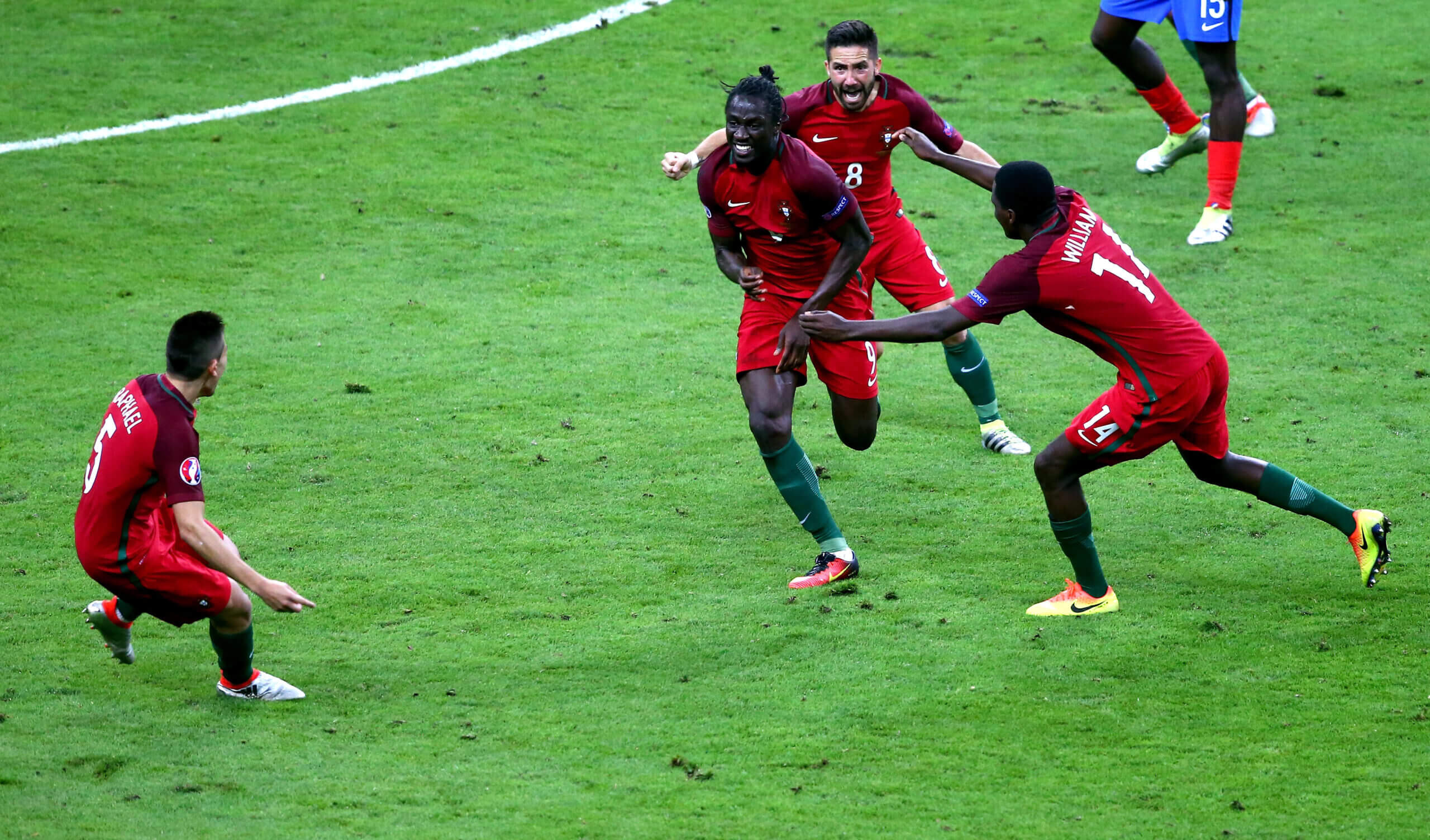 Eder celebrating Euro 2016 winning goal against France (Alex Livesey/Getty Images)
Eder celebrating Euro 2016 winning goal against France (Alex Livesey/Getty Images)
An Unconventional Champion
While Portugal’s Euro 2016 victory was historic, it was not achieved through dominant performances. They didn’t win a group stage game, needed a late winner against Croatia in the round of 16, won on penalties against Poland in the quarter-finals, and benefited from a favorable semi-final draw against Wales. Remarkably, Portugal led for only 11% of the tournament – a mere 73 out of 720 minutes played.
Statistically, teams like France, Germany, or even Italy might have been considered stronger contenders for the title. Some argue that Portugal fielded better teams in previous Euros, such as in 2000, 2004, 2008, and 2012. However, Euro 2016 represented a deserved reward for Portugal’s consistent development as a footballing nation. Having become regulars in the knockout stages of major tournaments in the 21st century, after decades of underachievement, Portugal’s triumph in 2016 felt like an inevitable breakthrough, albeit achieved in an unconventional and dramatic fashion.
(Top photo: Pressefoto Ulmer via Getty Images)
